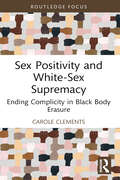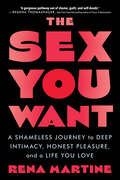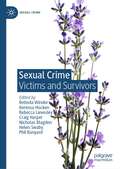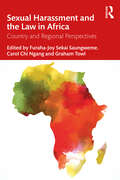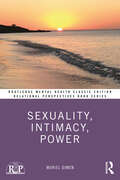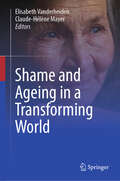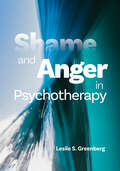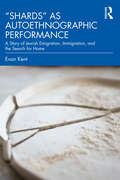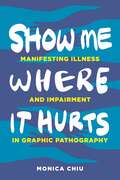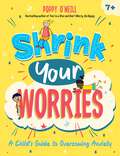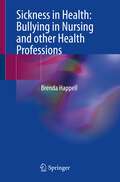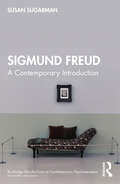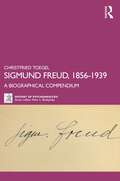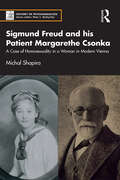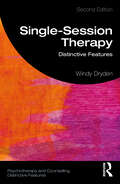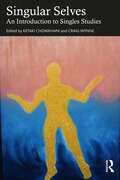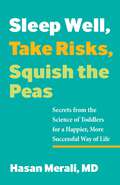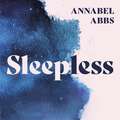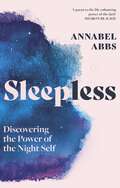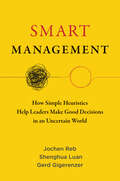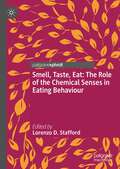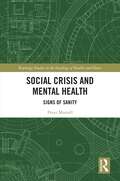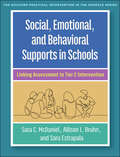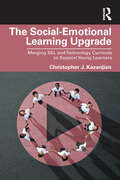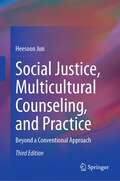- Table View
- List View
Sex Positivity and White-Sex Supremacy: Ending Complicity in Black Body Erasure (Leading Conversations on Black Sexualities and Identities)
by Carole ClementsThis text critically examines, argues, and demonstrates how the sex-positive movement is complicit in the perpetuation of White Supremacy and anti-black bias in the field of human sexualities, offering white sexuality professionals embodied ethical antiracist strategies for sexual inclusion and transformational change. In a world where whiteness is considered the sexual and bodily norm, Carole Clements proposes that the sex-positive movement has failed to examine how it maintains White Supremacy through the guise of inclusivity, and how the lack of a critical understanding of what "sex-positive" means has caused harm to black, indigenous, and people of color (BIPOC) individuals and communities alike. Pivoting away from a sex-positive/sex-negative binary, this book establishes a sex-critical discourse by introducing and operationalizing the term "White-sex Supremacy" to produce a racially just and embodied sexual ethic. Chapters begin by looking at sexual science and its racial origins, recounting how both the science of sex and that of race strived for positivist legitimacy in the same historical moment. Moving from the social construction of racial and sexual hierarchies, chapters look at eugenics and sexology’s early "sex-positive" pioneers, such as Margaret Sanger and Havelock Ellis, before examining the establishment of a race-evasive yet distinctly white sexual normality reliant on sex-positive framing. It shows how sex positivity became a popularized term without a clear definition other than "good," and how the legacy of white fragility leads to complicit white silence and the erasure of Black sexualities. Theoretical, practical, and accessible, it offers tangible methods for white sexuality professionals and scholars to learn accompliceship (over allyship) to promote antiracist sexual justice activism. This book is essential reading for white sexuality professionals, including sex educators, sex therapists, marriage and family therapists, licensed professional counselors, psychotherapists, gynecologists, and nurses, who are committed to examining their whiteness in the context of their commitment to sex positivity.
The Sex You Want: A Shameless Journey to Deep Intimacy, Honest Pleasure, and a Life You Love
by Rena MartineYou Deserve Great SexWhen it comes to relationships, our society has plenty of expectations. We're supposed to know how to speak up for ourselves in bed, be caring partners, and, of course, love ourselves first. But no one tells us how to actually do all those things, and we are left feeling unsatisfied, confused, and ashamed when we don't measure up.Former Deputy District Attorney Rena Martine was in that position. After rejecting the ideal white-picket fence life, she embarked on a journey to redefine intimacy in a way that felt true. In the years that followed, Rena defied all of society's sexual norms, built a presence as a global women's intimacy coach, and created the intimate life she craved.Now she brings those experiences to you! With no-holds-barred honesty, stories from real-life women, and sparkling humor, THE SEX YOU WANT will help you:Build a secure relationship with your most important partner—YOURSELFGet in touch with YOUR expectations for relationships so you can date more intentionallyDemystify lifestyle practices outside of the heterosexual-monogamous-vanilla box with frank discussions of female sexual fluidity, kink, and ethical non-monogamyFind apps, products, and communities to satisfy any curiosityBring deep intimacy and exciting variety into your bedroom and beyondWhen it comes to intimacy, vulnerability, and connection, you'll find that no two women are alike. THE SEX YOU WANT replaces cookie-cutter advice with powerful self-discovery tools to help you make friends with your own confidence and curiosity, build rock-solid relationships, and embrace what YOU love!
Sexual Crime: Victims and Survivors (Sexual Crime)
by Belinda Winder Kerensa Hocken Rebecca Lievesley Craig Harper Nicholas Blagden Helen Swaby Phil BanyardThis book offers an original contribution drawing together literature, research, practitioner and service user perspectives around the victimology of sexual crime and offending. Texts about sexual crime focus on the perpetration of sexual crime. This is important as, if we know how, why and in what situations people commit abuse, it will help us prevent further suffering. However, it is important that the voices of people who have experienced sexual abuse are heard and understood, as there is much we can learn from them - not simply about their experiences but improving our knowledge of victimisation also informs how we prevent sexual crime.
Sexual Harassment and the Law in Africa: Country and Regional Perspectives
by Furaha-Joy Sekai Saungweme Carol Chi Ngang Graham TowlWritten by a team of experts from legal, forensic, and policy backgrounds, this book presents new research into sexual violence and harassment across Africa.This first of it's kind book foregrounds the work of African scholars and presents careful research analysis and case studies that consider sexual harassment from legal, socio-economic, and cultural realities. It highlights the importance of laws around sexual harassment in Africa, the intersectional challenges it poses to women in the workplace, and the role of the feminist movement in Africa to hold perpetrators accountable and give voice to survivors of sexual harassment. The book forms part of a broader African-driven research initiative on sexual harassment and the law and is written in partnership with the Africa End Sexual Harassment Initiative (AESHI). It also explores the need to focus on best-practice benchmarks for Africa and also learning from developments in Africa.Timely and relevant, the book will be of great interest to legal and policy academic scholars, professionals, and activists working in the fields of gender policy, forensic psychology, and NGOs. It will also be useful reading for postgraduate students of law, gender studies, political science, and African studies.
Sexuality, Intimacy, Power: Classic Edition (Relational Perspectives Book Series)
by Muriel DimenThis book offers Dimen’s classic take on psychosexuality, drawing on relational theory, feminism and postmodernism, with a new foreword by Virginia Goldner and Velleda Ceccoli honouring the late Muriel Dimen and introducing a new audience to her profound legacy. For Dimen, the shift from dualism to multiplicity that has reshaped a range of disciplines can also be brought to bear on our thinking about sexuality. She urges us to return to the open-mindedness hiding between the lines and buried in the footnotes of Freud’s writings, and to replace the determinism into which his thought has hardened with more fluid notions of contingency, paradox, and thirdness. By unveiling the colloquy among psychoanalysis, social theory, and feminism, Dimen challenges clinicians and academicians alike to rethink ideas about gender, eroticism, and perversion. She explores, among other topics, the relations between lust and libido; the limitations of Darwinian thought in theorizing homosexuality; the body as projective test; and the intimate tangle of love and hate between women. Generous clinical examples illustrate the ways in which a radical re-visioning of psychosexuality benefits therapists and patients alike. A brilliant example of contemporary psychoanalytic theory at its destabilizing best, Sexuality, Intimacy, Power covers both clinical insights and theoretical rethinking that is invaluable for psychoanalysts, psychotherapists, and students of women’s, gender and queer studies.
Shame and Ageing in a Transforming World
by Elisabeth Vanderheiden Claude-Hélène MayerThe book provides a comprehensive overview of research and concepts related to shame and ageing, in the context of social change, upheavals and paradigm shifts, from transdisciplinary, cultural and transcultural perspectives. Drawing upon the editors' previous works on the topic of shame, this volume discusses the contexts of shame and ageing from theoretical, conceptual, and empirical perspectives. The toxic and stressful aspects of shame have been the focus of scientific analysis and discourse on shame and ageing. This volume explicitly makes the dimensions of shame a resource for individuals, and collective transformation processes the object of research in the context of ageing. It looks at emerging lifestyle, political, socio-economic and health contexts. It looks at how and why the frequency, intensity and handling of feelings of shame change over the course of life; the impact of shame on emotional well-being and mental health of older people; the impact of shame on social relationships and social engagement of older people in different cultures; the role of cultural values and norms in the development and processing of feelings of shame, especially in older people, and how these can be used for self-development; and the differences in the way older people in different cultures deal with feelings of shame and the way these can be used to develop effective strategies and techniques for older people to cope with shame. The editors and contributors thereby take cultural and gender aspects, as well as positive psychology and resource-orientated concepts, such as salutogenesis, resilience, happiness, fortitude, locus of control, faith- or strengths-based approaches into account and contextualize them against processes of social upheaval and transformation.
Shame and Anger in Psychotherapy
by Leslie S. GreenbergThis book examines shame and anger, their relationship with one another, and how mental health providers can work with each of them to produce therapeutic change. Although very different emotions, shame and anger are highly related in therapy. Because shame and anger have both adaptive and maladaptive forms, intervention differs depending on what type of shame or anger is being experienced and in what sequence they occur. Therapists need to consider the type of shame or anger they are dealing with and how the two emotions interact before they can make process diagnoses of what is occurring at different moments in a session. This book emphasizes the benefits of accessing and experiencing shame and anger viscerally to promote emotion change in therapy. It teaches therapists how to help clients access their shame or anger in a safe therapeutic setting to make this emotion amenable to transformation, and create new narratives based on the transformed feelings.
"Shards" as Autoethnographic Performance: A Story of Jewish Emigration, Immigration, and the Search for Home
by Evan Kent"Shards" as Autoethnographic Performance explores the development, creation, and presentation of performed autoethnography. The author shares the impetus for the work’s creation and his method for writing and rehearsing performed autoethnography. This book is essentially an autoethnography about writing and performing an autoethnography and functions as a "play within a play." Through extensive discussions about the development, writing, and performance of "Shards," the author reveals how contemporary political events and social issues as well as events in his ancestors’ history impact his writing, research, and eventual performance. The author takes us on an autoethnographic journey encompassing early 20th-century immigration from Eastern Europe to the United States, his personal development as a singer and actor, the practically obsessive need to perform, his education and eventual employment as a cantor in a synagogue, and how he negotiates these personal and artistic conflicts. Throughout the book, Evan shares with the reader highly personal stories of great honesty, sincerity, and candor. The book also provides insight into performing during the COVID-19 pandemic and how performing artists (including the author) utilized online performing venues. This book would be a good companion volume for classes in qualitative research, autoethnography, and performance studies, as well as for those looking for a guide on writing, rehearsing, and performing solo theatre.
Show Me Where It Hurts: Manifesting Illness and Impairment in Graphic Pathography (Graphic Medicine)
by Monica ChiuIn Show Me Where It Hurts, Monica Chiu argues that graphic pathography—long-form comics by and about subjects who suffer from disease or are impaired—re-vitalizes and re-visions various negatively affected corporeal states through hand-drawn images. By the body and for the body, the medium is subversive and reparative, and it stands in contradistinction to clinical accounts of illness that tend to disembody or objectify the subject.Employing affect theory, spatial theory, vital materialism, and approaches from race and ethnic studies, women and gender studies, disability studies, and comics studies, Chiu provides readings of recently published graphic pathography. Chiu argues that these kinds of subjective graphic stories, by virtue of their narrative and descriptive strengths, provide a form of resistance to the authoritative voice of biomedicine and serve as a tool to foster important change in the face of social and economic inequities when it comes to questions of health and healthcare. Show Me Where It Hurts reads what already has been manifested on the comics page and invites more of what demands expression.Pathbreaking and provocative, this book will appeal to scholars and students of the medical humanities, comics studies, race and ethnic studies, disability studies, and women and gender studies.
Shrink Your Worries: A Child's Guide to Overcoming Anxiety
by Poppy O'NeillA worry-busting guide to help 7+-year-oldsEncourage your child to listen to their feelings, practise positive thinking and overcome their fears with this sensitive and supportive book. Bursting with activities, handy tips and simple exercises, Shrink Your Worries is the self-care companion every stress-prone child needs.
Sickness in Health: Bullying in Nursing and other Health Professions
by Brenda HappellThis book informs students and practitioners of the health professions about workplace bullying and how to recognise it. The health professions have among the highest rates of bullying of any occupational group. This book shines a light on bullying and its very real human consequences for health professionals. Statistics about bullying in health present a disturbing picture. However, they don't convey the human impact on people who only want to do good for others. The author begins by telling how her experiences spurred her to write this book and then introduces the champions, twelve health professionals who contributed their stories. The book starts with the champions' decision to become a health professional, and then describes their bullying experiences, the impact on almost every aspect of their lives and careers, and how they tried to resolve or deal with the bullying. Some were still dealing with bullying, and all felt they had been forever changed by their experiences.The stories show that bullying is much more than the actions of a few, it is deeply embedded in the culture of institutions responsible for providing quality health care. Better preparation for leadership positions and independent processes for reporting unacceptable behaviours and actions are two suggestions for tackling bullying and its consequences. This book shows the necessity to expose these appalling behaviours and their human costs in order to address workplace bullying and create a healthy and safe environment for everyone in healthcare. This volume is aimed at undergraduate and postgraduate students, and practitioners of nursing and other health professions, the general public and other stakeholders of health services. It will enhance their understanding of, ability to recognise, and strategies to cope with, workplace bullying.
Sigmund Freud: A Contemporary Introduction (Routledge Introductions to Contemporary Psychoanalysis)
by Susan SugarmanIn this clear and concise volume, Susan Sugarman introduces the work of Sigmund Freud and keenly illustrates the impact his pioneering contributions have had on the way we think about ourselves and each other. Part of the Routledge Introductions to Contemporary Psychoanalysis series, this book sees Sugarman offer a comprehensive overview of Freud’s major theories, their clinical application, and their empirical reach. She highlights the ways in which his work is commonly misinterpreted and expertly guides the reader through his key publications on not only his general theory but also neuroses, dreams, ordinary waking mental life, and civilization and society. Considering Freud’s body of work as a whole, she explores the observations and reasoning that led him to the questions he raised and the conclusions he reached, showing the rich and nuanced approach in his writing. Sigmund Freud: A Contemporary Introduction is an essential read for psychoanalysts, both in practice and in training, as well as students and scholars looking to understand the legacy of Freud’s work.
Sigmund Freud, 1856-1939: A Biographical Compendium (The History of Psychoanalysis Series)
by Christfried ToegelSigmund Freud, 1856–1939 draws on a wide range of primary sources to present all the datable events that took place in Sigmund Freud’s life, shining new light on his day-to-day experiences. Christfried Toegel’s work provides details and context for the personal, social and political conditions under which Freud developed his theories during this time period. The book’s timeline presents not only significant events but also the small and everyday interactions and experiences in Freud’s life. Drawn from sources including Freud’s calendars, notebooks, travel journals and lists of fees, letters and visits, this unique book provides unparalleled insight into his work.Sigmund Freud, 1856–1939 will be of great interest to psychoanalysts in practice and in training, as well as academics and scholars of Freud, psychoanalytic studies, the history of science and the history of Europe.
Sigmund Freud and his Patient Margarethe Csonka: A Case of Homosexuality in a Woman in Modern Vienna (History of Psychoanalysis)
by Michal ShapiraThis book provides a historical analysis of one of Sigmund Freud’s least-studied cases, published in 1920 as The Psychogenesis of a Case of Homosexuality in a Woman. Scholars of sexuality often focus on Freud’s writings on male homosexuality, disregarding his views on homosexual women. This book serves as a corrective, renewing and reinvigorating interest in Freud, and demonstrating that his views on sexuality are as relevant today as ever. Part I introduces the case and explores Freud’s attitudes towards lesbianism, radical among his medical colleagues in the early twentieth century. It also puts Margarethe Csonka, the patient, at its centre. Michal Shapira considers Freud’s only treatment of a "female homosexual" and assesses Csonka’s background life before and after the encounter. Part II expands the case beyond the scientific-medical purview of the times and looks at the new opportunities afforded to women and assimilated Jews through growing equality and the modernization of urban life in 1920s Vienna. This book places Csonka’s case within the broader context of medical and psychological texts, Freud’s own writings, Jewish and queer history, and modern Vienna’s urban and art history. Sigmund Freud and his Patient Margarethe Csonka will be of great interest to psychoanalysts in practice and in training, and to readers interested in the history of gender and sexuality, feminism, modern European and urban history, the history of psychoanalysis, science and medicine, and the history of ideas.
Single-Session Therapy: Distinctive Features (Psychotherapy and Counselling Distinctive Features)
by Windy DrydenThe new edition of Single-Session Therapy: Distinctive Features provides an up-to-date general introduction to the field of Single-Session Therapy (SST). Written by eminent clinician and author Windy Dryden, this book challenges mainstream therapeutic assumptions, predicated on the certainty that clients will have more than one therapy session. Following the popular Distinctive Features format, the book is divided into two sections, with 15 chapters describing theoretical features and 15 offering practical techniques of SST. Updates to the revised edition include new chapters on the importance of the working alliance in SST, on different types of help that clients seek from SST and on common errors in SST and how to avoid them. Single-Session Therapy will be of interest to those across the psychotherapy and counselling professions and will provide extensive guidance for students, trainees and practitioners alike.
Singular Selves: An Introduction to Singles Studies
by Ketaki Chowkhani and Craig WynneThis book examines, for perhaps the first time, singlehood at the intersections of race, media, language, culture, literature, space, health, and life satisfaction. It adopts an interdisciplinary approach, borrowing from sociology, literary studies, medical humanities, race studies, linguistics, demographic studies, and critical geography to understand singlehood in the world today. This collection of essays aims to establish the discipline of Singles Studies, finding new ways of examining it from various disciplinary and cultural perspectives. It begins with laying the field and then moves on to critically look at how race has shaped the way we understand singlehood in the West and how class, age, gender, privilege, and the media play a role in shaping singlehood. It argues for a need for increased interdisciplinarity within the field, for example, analyzing singlehood from the perspective of medical humanities. The volume also explores the role workplace, living arrangements, financial status, and gender play in single people’s life satisfaction. With an interdisciplinary and transnational approach, this interdisciplinary volume seeks to establish Singles Studies as a truly global discipline. This pathbreaking volume would be of interest to students and researchers of sociology, literature, linguistics, media studies, and psychology.
Sleep Well, Take Risks, Squish the Peas: Secrets from the Science of Toddlers for a Happier, More Successful Way of Life
by Hasan MeraliToddlers hold the secrets to having more fun and living a fulfilling life. These are secrets we once knew and ones that a Harvard-trained physician can help us rediscover.Terrible twos, temper tantrums, and grocery store meltdowns are usually the first things that come to mind when people think of toddlers. But pediatric emergency medicine physician and researcher Dr. Hasan Merali has long thought toddlers are among the best people in our society and adults could do well to learn from them. These extraordinary youngsters can be impulsive, yes, but with this comes a remarkable ability to take risks and ask questions—two qualities that can help us enjoy life more. Toddlers act kindly toward strangers, are eager to work with others to solve problems, and demonstrate extraordinary dedication and perseverance. These are all traits that many of us aspire to have in order to improve both our personal and professional lives. To unpack this behavior, Dr. Merali includes many humorous examples from his experience as a pediatrician and father, but the core lessons are drawn from two decades worth of fascinating and surprising studies in child psychology and development. Merali connects these studies to research about adults to create the first book to offer adults important lessons that can be gleaned from toddlers. Toddlers can teach you many things, including how to: Lose weight naturally Sleep better Build stronger friendships Improve teamwork Be more productive Have more fun, and Live a more fulfilling life Sleep Well, Take Risks, Squish the Peas shows us how toddlers bring out the best in humanity and how we can, too. It&’s a whole new way of looking at and learning from toddlers.
Sleepless: Discovering the Power of the Night Self
by Annabel Abbs'Sleepless has changed how I feel about sleep . . . I was captivated' The Times, Book of the Week'This book will inspire you to get up, light a candle, and experience your own Night Self' Financial TimesTHE NIGHT SELF IS: CREATIVE. CURIOUS. VULNERABLE. ENCHANTED. COURAGEOUS.In the winter of 2020, Annabel Abbs experienced a series of bereavements. As she grieved, she kept busy by day, but at night sleep eluded her. And yet her sleeplessness led to a profound and unexpected discovery: her Night Self. As the night transformed into a place of creativity and liberation, Annabel found she wasn't alone. From the radical fifteenth-century philosopher Laura Cereta and subversive artist Louise Bourgeois, to Virginia Woolf and the activist Peace Pilgrim, women have long found sanctuary, inspiration and courage in darkness.Drawing on the latest science, which shows we are more imaginative, open-minded and reflective at night, Annabel set out to discover the potential of her Night Self. Sleepless follows her journey, from midnight hikes to starlit swims, from Singapore, the brightest city on Earth, to the darkest corner of the Arctic Circle, and finally to that most elusive of places - sleep.A moving, revelatory voyage into the dark, Sleepless invites us to feel less anxious about our sleep, and to embrace the possibilities of the night.
Sleepless: Discovering the Power of the Night Self
by Annabel Abbs'Sleepless has changed how I feel about sleep . . . I was captivated' The Times, Book of the Week'This book will inspire you to get up, light a candle, and experience your own Night Self' Financial TimesTHE NIGHT SELF IS: CREATIVE. CURIOUS. VULNERABLE. ENCHANTED. COURAGEOUS.In the winter of 2020, Annabel Abbs experienced a series of bereavements. As she grieved, she kept busy by day, but at night sleep eluded her. And yet her sleeplessness led to a profound and unexpected discovery: her Night Self. As the night transformed into a place of creativity and liberation, Annabel found she wasn't alone. From the radical fifteenth-century philosopher Laura Cereta and subversive artist Louise Bourgeois, to Virginia Woolf and the activist Peace Pilgrim, women have long found sanctuary, inspiration and courage in darkness.Drawing on the latest science, which shows we are more imaginative, open-minded and reflective at night, Annabel set out to discover the potential of her Night Self. Sleepless follows her journey, from midnight hikes to starlit swims, from Singapore, the brightest city on Earth, to the darkest corner of the Arctic Circle, and finally to that most elusive of places - sleep.A moving, revelatory voyage into the dark, Sleepless invites us to feel less anxious about our sleep, and to embrace the possibilities of the night.
Smart Management: How Simple Heuristics Help Leaders Make Good Decisions in an Uncertain World
by Jochen Reb Shenghua Luan Gerd GigerenzerWhy successful leaders must embrace simple strategies in an increasingly uncertain and complex world.Making decisions is one of the key tasks of managers, leaders, and professionals. In Smart Management, Jochen Reb, Shenghua Luan, and Gerd Gigerenzer demonstrate how business leaders can utilize heuristics—simple decision-making strategies adapted to the task at hand. In a world that has become increasingly volatile, uncertain, complex, and ambiguous (VUCA), the authors make the case against complex analytical methods that quickly reach their limits. This against-the-grain approach leads to decisions that are not only faster but also more accurate, transparent, and easier to learn about, communicate, and teach. Smart Management offers an evidence-based yet practical discussion of how business leaders can use smart heuristics to make good decisions in a VUCA world.Building on the fast-and-frugal heuristics program, Smart Management demonstrates the efficacy of heuristic decision making in a twofold approach. First, it introduces the concept of ecological rationality, which prescribes the environmental conditions under which specific heuristics work well. Second, the book describes a repertoire of heuristics, referred to as the adaptive toolbox, that leaders, managers, and professionals can develop and rely on to make a variety of decisions, such as on business strategy, negotiation, and personnel selection. The toolbox not only showcases the practical usefulness of these heuristics but also inspires readers to discover and develop their own smart heuristics.
Smell, Taste, Eat: The Role of the Chemical Senses in Eating Behaviour
by Lorenzo D. StaffordThis edited collection synthesises recent research into smell and taste and relates it to eating behaviour. Olfaction - the sense of smell - together with taste are known as the ‘chemical senses’ and are the oldest sensory system. It is paradoxical then that our knowledge (especially psychological) about these two systems remains far behind that of vision and audition. Nevertheless, the past twenty years has seen a significant increase in our understanding of these sensory systems and the contributors to this book, many of whom helped to reveal key findings in this research domain, explore theories which attempt to explain appetite control, associative odour learning and multisensory perception, among others. It further brings the reader up to date on the current state of knowledge on disordered eating and olfactory disorders. Finally, it bridges across different academic disciplines to reveal the importance of the chemical senses in indigenous people in Guyana.
Social Crisis and Mental Health: Signs of Sanity
by Peter MorrallThis book focuses on the paradoxical effect of social crises on mental health. When crises occur, there's an upsurge of mental suffering due to an intensification of such social insanities as violence, inequality, and insecurity. Paradoxically, there are positive consequences due to acts of kindness, cooperation, and the ability to cope and hope. Two interconnected categories of social crises are covered in the book. These are as follows: contagions (for example, the COVID-19 pandemic, numerous outbreaks of plague and smallpox since medieval times, and the 1918 influenza pandemic); conflicts (including the Russian invasion of Ukraine, and aspects of world war such as the Holocaust, the use of nuclear bombs in the Second World War, and the climate emergency). What is also explored in the book is whether there is an amplification of everyday difficulties whereby having a ‘mental health problem’ has become normalised. The idea of ‘mental-healthism’ is introduced to explain the cultural shift towards this apparent normalisation of ordinary psychological suffering. The book will be of interest to students, practitioners, and researchers from sociology, psychology, nursing, social work, and psychiatry, among others.
Social, Emotional, and Behavioral Supports in Schools: Linking Assessment to Tier 2 Intervention (The Guilford Practical Intervention in the Schools Series)
by Sara C. McDaniel Allison L. Bruhn Sara EstrapalaMeeting a critical need, this accessible guide addresses the "whats," "whys," and "how-tos" of developing and implementing effective Tier 2 social, emotional, and behavioral supports. The book provides explicit steps for identifying K–12 students who could benefit from Tier 2, matching evidence-based interventions to student needs, and making individualized, data-based decisions regarding adapting, fading, or intensifying supports. Chapters review exemplary interventions in the areas of conduct, self-regulation, social issues, emotional issues, and co-occurring academic and social–emotional–behavioral needs. The place of Tier 2 in schoolwide positive behavioral interventions and supports (PBIS) is explained, and keys to implementation fidelity are highlighted. In a large-size format for easy photocopying, the book includes 23 reproducible forms and checklists that can also be downloaded and printed. This book is in The Guilford Practical Intervention in the Schools Series, edited by Sandra M. Chafouleas.
The Social-Emotional Learning Upgrade: Merging SEL and Technology Curricula to Support Young Learners
by Christopher J. KazanjianThe Social-Emotional Learning Upgrade explores how today’s educators can connect two previously separated but important curricula in their schools: social-emotional learning (SEL) and educational technology. With schools’ SEL efforts pressed for time and resources and digital engagements often limited to skill development, K-12 students risk being unprepared to sustain their well-being and personal opportunities in a rapidly changing, technology-dependent world. Driven by a paradigm that synthesizes multicultural education and humanistic psychology, this book readies educators to implement SEL curricula that will support young learners as they navigate constant social and technological flux and that will nurture their unique perceptions of reality, their aspirations, and their mental and physical health. Each chapter’s novel insights will help to mitigate both student disengagement and teacher demoralization, enabling classroom pedagogies and the process of schooling to better align with the ways in which learners explore, express, and create meaning. Guiding pre-service teachers, leaders, and curriculum developers beyond common goals such as digital skills development, content mastery, or standardized testing, this volume focuses instead on complex digital literacies, collaborative experiences, problem- and project-based learning, culturally relevant pedagogies, and overall holistic growth.
Social Justice, Multicultural Counseling, and Practice: Beyond a Conventional Approach
by Heesoon JunThis third edition book offers a paradigm shift in thinking (from binary to complex) and enables visibility for the intersectionality of multiple identities that range from privileged to oppressed. For example, real people’s heterogeneous racial identities within the same racial group are visible. A paradigm shift in learning (from conceptual to transformative) connects conceptual learning (cognition) to their experience (affect). “…. transformation does not simply emerge due to the individual’s awareness…. but is experienced” (Benetka & Joerchel, 2016, p. 22). Uncensored first-person (subjective) written responses to specific questions to access unconscious and implicit bias will connect the writer’s experience to conceptual learning of diversity, equity, and inclusion. Writing in third person (objective) interrupts the transformative aspect by bypassing the accessibility of inner experience. Writing in first-person connects the writer to their experience which allows the unconscious to be accessed if it is practiced on a regular basis. This book is for everyone who wants to implement diversity, equity, and inclusion measures by learning to access their unconscious bias. Understanding social justice and equity and good intentions alone do not lead to accessing unconscious bias.
